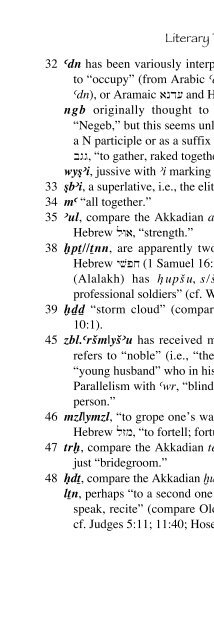A Primer on Ugaritic: Language, Culture, and Literature - enenuru
A Primer on Ugaritic: Language, Culture, and Literature - enenuru
A Primer on Ugaritic: Language, Culture, and Literature - enenuru
Create successful ePaper yourself
Turn your PDF publications into a flip-book with our unique Google optimized e-Paper software.
Literary Texts 131<br />
32 {dn has been variously interpreted. Perhaps related<br />
to “occupy” (from Arabic {dh), or “to prepare” (from Arabic<br />
{dn), or Aramaic <strong>and</strong>o <strong>and</strong> Hebrew zo, “then.”<br />
ngb originally thought to be a reference to the biblical<br />
“Negeb,” but this seems unlikely. ngb could be interpreted as<br />
aNparticiple or as a suffix c<strong>on</strong>jugati<strong>on</strong> of gbb as in Aramaic<br />
bgg, “to gather, raked together, accumulate.”<br />
wys}i, jussive with }i marking Ø vowel.<br />
33 sb}i, a superlative, i.e., the elite of the army.<br />
34 m{ “all together.”<br />
35 }ul, compare the Akkadian awilu, “freeman,” or possibly the<br />
Hebrew lwa, “strength.”<br />
38 h˙pt//tnn, are apparently two categories of people; compare<br />
Hebrew yvpj (1 Samuel 16:25) <strong>and</strong> Amarna h˙ubs¥u. Akkadian<br />
(Alalakh) has h ups¥u, s/s¥ananu, “first born farmers,<br />
professi<strong>on</strong>al soldiers” (cf. Wiseman).<br />
39 h˙dd “storm cloud” (compare the Hebrew Myzyzj, Zechariah<br />
10:1).<br />
45 zbl.{rs¥m|ys¥}u has received many interpretati<strong>on</strong>s. Perhaps zbl<br />
refers to “noble” (i.e., “the nobe carries beds”), or zbl as a<br />
“young husb<strong>and</strong>” who in his enthusiasm “rises from the bed.”<br />
Parallelism with {wr, “blind” might suggest that zbl is a “sick<br />
pers<strong>on</strong>.”<br />
46 mzl|ymzl, “to grope <strong>on</strong>e’s way, avoid obstacles.” Compare the<br />
Hebrew lzm, “to fortell; fortune.”<br />
47 trh˙, compare the Akkadian terh˙atu, “bride price,” or possibly<br />
just “bridegroom.”<br />
48 hdt, compare the Akkadian h˙udas¥tu, “marriage.”<br />
ltn, perhaps “to a sec<strong>on</strong>d <strong>on</strong>e (i.e., another).” Or, from tny, “to<br />
speak, recite” (compare Old/Late Hebrew hnv; Aramaic ynt;<br />
cf. Judges 5:11; 11:40; Hosea 8:9).


